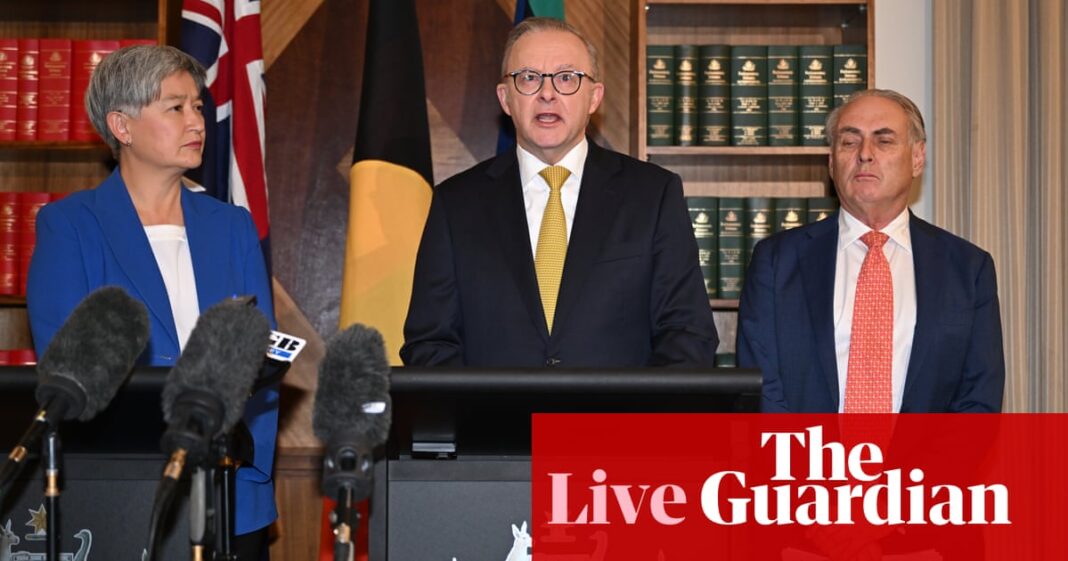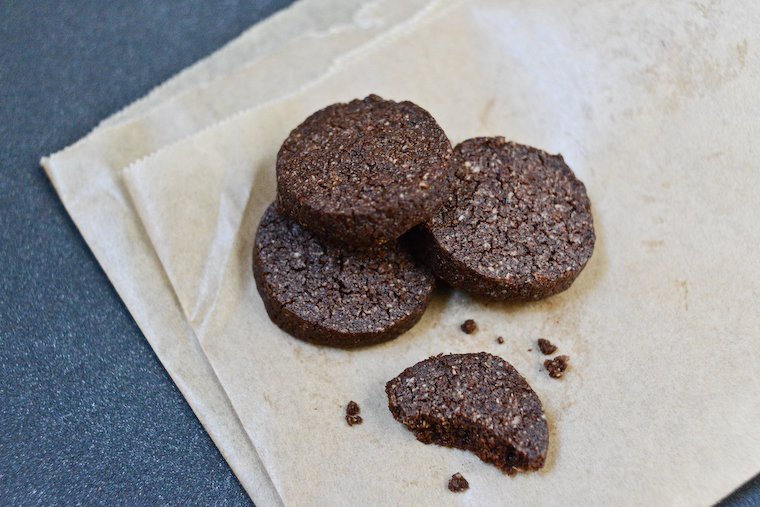Albanese says ‘no one has got a better deal’ than Australia in Trump’s tariff regime
Anthony Albanese emphasises that “no one has got a better deal” than Australia, and diplomats and officials are continuing to engage with the administration:
We have made very strong representations. Ministers, our ambassador, people in the embassy, people at departmental level, we’ve used every asset at our disposal.
But what it does mean – it’s a bit like what I was saying yesterday. Steel and aluminium, there’s not more steel and aluminium being produced in the United States today than there was in February.
The PM says that his understanding is that these 10% tariffs will be across the board.
Australia and the United Kingdom were in negotiations, I’m not sure about other countries, but I know that we were and that was under consideration … So our understanding is that it applies across the board.
He says again the best response is to buy Australian, and Labor will continue to promote Australian products (like Bundaberg ginger beer which he says he had at the Bundaberg factory when he was up campaigning in Queensland earlier this week).
Key events
Map of the islands included in tariff regime
Here is the map of the of the islands that are included in the tariff regime from the United States.
Anthony Albanese spoke about the 29% tariff imposed on Norfolk Island earlier – if you missed his comments, you can read those here.

Emily Wind
The biggest exports Australia makes to the US
Let’s take a look at Australia’s biggest exports to the US amid the latest tariff announcements this morning.
Australian exports to the US totalled US$14.73bn in 2024, according to the UN’s Comtrade database on international trade.
The Top Ten exports to the US last year were (in US dollars):
-
Meat and edible meat offal: $4.03bn
-
Pearls, precious stones, metals and coins: $2.02bn
-
Pharmaceutical products: $1.35bn
-
Optical, photo, technical and medical apparatus: $1.20bn
-
Machinery, nuclear reactors and boilers: $1.16bn
-
Electrical and electronic equipment: $686.78m
-
Aircraft and spacecraft: $663.41m
-
Animal, vegetable fats and oils, and cleavage products: $275.71m
-
Aluminium: $268.58m
-
Iron and steel: $265.75m
Summary of governments proposed response to Trump tariffs
Let’s go back to the five-point plan the government has announced in response to the tariffs. Here are the points in a bit more detail:
-
The government will give $5m to the anti-dumping commission to reduce case times, and better monitor goods and high-risk activities from overseas. There were concerns from industry that tariffs could lead to some countries “dumping” cheap stock into Australia.
-
There’s also $50m to help industries find new markets.
-
A new economic resilience program within the national reconstruction fund which will provide $1bn of zero interest loans to help industry access new markets.
-
Prioritise Australian firms in government procurement by requiring government to preference Australian businesses for procurement up to a threshold – including consideration of local content requirements for procurements above $1m.
-
Establish a critical minerals strategic reserve to underwrite critical mineral production and supply.
Albanese: Norfolk Island not a trade competitor with ‘giant economy’ of the US
The first question goes straight to tariffs.
As Dan Jervis-Bardy (who’s with the prime minister at this press conference) brought you earlier, it’s been confirmed there will not be a ban on Australian beef, but the industry will be hit with the 10% tariffs.
Albanese says he’s spoken to the national farmers federation and beef producers, to confirm the tariff impacts with them.
All Australian supports are with them at this time and it is a really difficult period for them but it will be a 10% tariff. Brazil has the same so in terms of the competitive position, it is maintained.
Of course the most shocking tariffs put in place are those on Norfolk Island …
Norfolk Island has got a 29% tariff. I’m not quite sure that Norfolk Island, with respect to it, is a trade competitor with the giant economy of the United States but that just shows and exemplifies the fact that nowhere on earth is exempt from this.
Albanese announces new PBS listings
Off the back of Trump announcing tariffs on goods including pharmaceuticals, Albanese is announcing more medicines to be put on to the pharmaceutical benefits scheme.
Albanese says the new medicines include one listed to treat glioma, which occurs in the brain and spinal chord and is the most common cancer in the central nervous system in children.
This is expected to support 130 Australian children and their families every year. Without this PBS subsidy, families could be up for up to $178,000 a year. As a result of this decision, when they come into pharmacies like this, the cost will be just $25 per prescription, making an enormous difference.
The health minister, Mark Butler, says a medicine to help treat bone marrow cancer has also been added:
1,900 patients a year who would otherwise be paying $70,000 on the private market for this life changing, life-saving treatment for this rare form of bone marrow cancer.
Stock market stumbles after Trump tariff annoucement

Patrick Commins
Investors are being “liberated” of billions of dollars, as sharemarkets begin to tumble after the unveiling of Trump’s sweep of new tariffs.
In early trade this morning, the benchmark ASX 200 index has dropped by 1.8% to 7794 points.
That follows US stock futures plunging by more than 3% as investors priced in the rising chance of a global trade war, Bloomberg is reporting.
Sticking with Wall Street, the likes of Nike, Gap and Lululemon cratered by more than 7% – a strong sign that the 10% blanket tariffs – and much larger imposts on Japan, the EU and, especially, China – will not do the global retailers any favours.
The Greens leader, Adam Bandt, says Australia should “end Aukus” in response to Donald Trump’s latest tariffs.
In a series of posts to X (formerly Twitter), Bandt wrote:
End Aukus.
Forget Trump’s ‘Liberation Day’, today should be Australia’s liberation day — when we finally liberate ourselves from being shackled too closely to Trump.
Trump is dangerous. It’s time for Labor & Liberal to act. Let’s cancel AUKUS & set our own independent foreign policy.

Dan Jervis-Bardy
The press pack following Anthony Albanese is jetting out of Melbourne after the prime minister’s early morning press conference to respond to Donald Trump’s tariff strike.
We’ll let you know as soon as we land at our next destination.

Benita Kolovos
Vic premier emphasises tariff impacts on working people, families and jobs.
The Victorian premier, Jacinta Allan, has described tariffs imposed by the US on Australian exports as “entirely unjustifiable”. Speaking outside parliament this morning, she said:
They’re unjustifiable, particularly when you consider the impact they are going to have on working people, not just around Victoria or Australia, but around the globe. These sorts of measures only put more pressure on working people, on their families and on their jobs.
She says Victoria is the “food bowl of the nation” and was important to protect the state’s biosecurity:
We are known internationally for our clean, green reputation for exporting to the world high-quality produce. So I strongly support the prime minister’s emphasis on ensuring those biosecurity arrangements remain strong.
Allan also said she would continue to push local content requirements for Victorian transport projects and revealed she met with defence manufacturer Lockheed Martin last week to put the state’s businesses at the “front of the queue in the supply chain”.
Australia’s red meat industry will remain ‘strong’ despite tariffs, says advisory council
The Red Meat Advisory Council (RMAC) says it’s “disappointed” of tariffs on red meat exports to the US, but noted there will be no ban on Australian red meat and that trade with the US will continue.
The council says the decision fails to recognise the industry’s contribution to US food supplies, but also pointed out how diverse the trade market is, particularly across Asia.
The RMAC Chair, John McKillop, says producers can be “assured” the industry will continue to operate in a “strong global trading environment”.
It remains a disappointing decision from the US, in stark contrast to our 20-year partnership under the Australia-United States Free Trade Agreement …
Last year, 2024, was a record year for Australian red meat exports, driven by strong global demand. Australian producers can be assured that we operate in a strong global trading environment with high demand for our red meat from over 100 markets.
Major markets include Greater China, Japan and Korea, worth $3.9bn, $2.6bn and $2.5bn respectively. The Middle East / North Africa Market is worth A$2B and offers demand growth opportunities.
‘We already made concessions’ on beef, says Littleproud
Littleproud spells out some more of that risk that has previously led to a ban on US beef into Australia.
Albanese said earlier it started back in 2003 due to mad cow disease.
Littleproud says the current risk is around the supply chains that go beyond US borders:
It’s their supply chain in the Americas, with particularly Canada and Mexico, that we can’t get certainty on, that gives us that confidence to allow that product to come in. But we already take frozen beef, we already made concessions.
Littleproud also says Australia should reengage with partners within the trans-pacific partnership (CPTPP).
Littleproud blames PM’s ‘disparaging comments’ on Trump for tariffs on Australia
The Nationals leader and shadow agriculture minister, David Littleproud, says there’s “deep disappointment” over the tariffs, and that there’s a need for a “relationship reset”.
He’s putting some of the blame on the prime minister and government for having made disparaging comments of Trump in the past.
What we need is a relationship reset. We’ve got a prime minister who can’t even get a phone call with the president. That’s because of the personal disparaging comments he made in the past. We need a reset to explain to President Trump, when you look at the tariffs he imposed on beef, he’s imposing that cost on his own people.
Littleproud adds, specifically on beef, that Australia already takes US frozen beef, and that Australia shouldn’t reduce biosecurity standards to allow other beef imports from the US.
Dutton says some ABC journalists are ‘good’ while others are ‘partisan players’
Dutton was also challenged on 2GB to name a journalist at the ABC who he thinks does “a good job”, as he leaves the door open to cutting the public broadcaster’s funding.
He initially skirts the question and says families and small businesses are struggling.
Nobody at the ABC gets $1 of pay without you being funded by Australian taxpayers. And as I’ve said before, if we find waste in the ABC then we won’t support that, and Australian households and businesses would expect nothing less.
Host Ben Fordham tries again – he mentions David Speers, Sarah Ferguson and Laura Tingle … Dutton answers that there are some “partisan players” within the organisation.
I think there are some good journalists at the ABC, but I think there are some who you know, who, frankly, are just partisan players. And people see that on their TV screens every night. And again, the ABC is using taxpayers money, so use it wisely.





